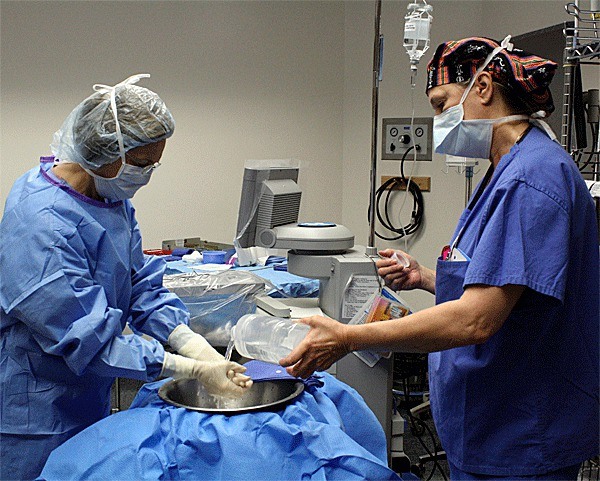Grabbing consent forms from down the hall would only take a few minutes, but Gail Forrester, a Registered Nurse and the Director of Surgical Services at Whidbey General Hospital, turned on a small, rippling fountain for me to listen to as I waited.
“This is more relaxing,” she said.
Visiting the hospital as a reporter, I didn’t expect to be cared for like a patient, but as I would come to learn, the nurses at Whidbey General can’t help but nurture those around them — compassion flows through their veins as abundantly and freely as the blood they draw and analyze.
I went to the hospital to spend some time shadowing Teri Mellema, a preoperative nurse Gail had arranged for me to meet. Next week, Nov. 8 through 14, is “Perioperative Nurse Week,” and I wanted to write a piece about the work they do and introduce them to the community. I didn’t realize what a large task capturing that work would be.
Perioperative nurses serve as the watchdogs in operating rooms. It’s their job to prep patients before surgery, monitor them during and take care of them afterwards. Perioperative nurses make sure the right procedures are being performed on the right patients, and they are the ones who sign off on a patient’s charts. But because their patients are often on anesthesia or sedated during their tasks, perioperative nurses’ unrivaled dedication to patient safety is rarely remembered or appreciated.
Teri Mellema started working at Whidbey General on July 1. She’s been working as a nurse for nearly 30 years and spent time traveling around the country assisting in hospitals that were understaffed. Shortly after I met her in the hospital’s break room I was changed into scrubs and given a cap. Whether she could sense my clumsiness or whether it was simply in her subconscious to assist the helpless I can’t be sure, but as Teri began explaining to me the cataract procedure we’d be watching later that morning, she also fit sterile booties over my shoes and helped tuck straggling pieces of my hair under elastic.
Before the surgery Teri told me about her responsibilities at the hospital. She said the number one priority of any preoperative nurse is patient safety — making sure the right medications are delivered and the right surgical protocol is followed.
“I ask patients the same questions 100 times even though it probably drives them nuts,” she said. “I need to know as a nurse that they understand what’s going on with their bodies.”
Teri said she likes perioperative nursing because it allows her to focus all of her attention on one patient at a time. Every time she picks up a new case she enters into it with the mindset that the patient is a family member and treats him or her as such.
“The last thing I want to do is to have something happen that I would think about for the rest of my life,” she said. … “If you don’t have your health you don’t have anything, and that’s why I like being a patient advocate.”
When we entered the operating room, the surgeon, anesthesiologist and nurses were preparing their cataract patient. Teri and I were only supposed to be observing, and yet she managed to assist her teammates and remind them of the patient’s tender neck muscles without ever taking a break from explaining the surgical process to me.
“The hospital is my home away from home,” Teri had told me earlier. “It’s second nature.” No kidding.
An impressive three minutes into the procedure, I was already starting to feel lightheaded. (Note: watching Grey’s Anatomy does not sufficiently prepare a person to enter a real operating room, who knew?) About five minutes into the procedure I started to clam up and sweat through my scrubs and black dots were blurring my vision. But before I could even fully (and shamefully) admit to Teri that I was feeling queasy, she and another perioperative nurse, Lanie Kiel, had me sitting on a stool, my scrubs rolled up, my mask untied and cool wash cloths applied to my skin.
After my embarrassment faded, it hit me there on that stool just how amazing these nurses were. They were able to monitor the entire room, assist in a successful operation and babysit a cocky reporter at the same time. It’s no wonder there’s a week dedicated just to their services.
About 20 nurses work full time at Whidbey General and they have more than 400 years of experience among them. In order to honor them next week, or after any hospital stay, people should write letters to the hospital to thank the staff members for their superb care, fill out patient surveys, share smiles or deliver baked goods (I hear Rice Krispie treats and chocolate balls do not last long in the break room).
When I first decided to take on this story, I spoke to Gail a few times beforehand on the phone.
“Perioperative Nurse Week is about highlighting the professionals that people don’t remember,” she said. But for me, meeting Teri Mellema, and knowing the comforting presence of all the nurses at the hospital, is something I’ll never forget.
Learn more
To learn more about perioperative nurses and their work, visit aorn.org.



